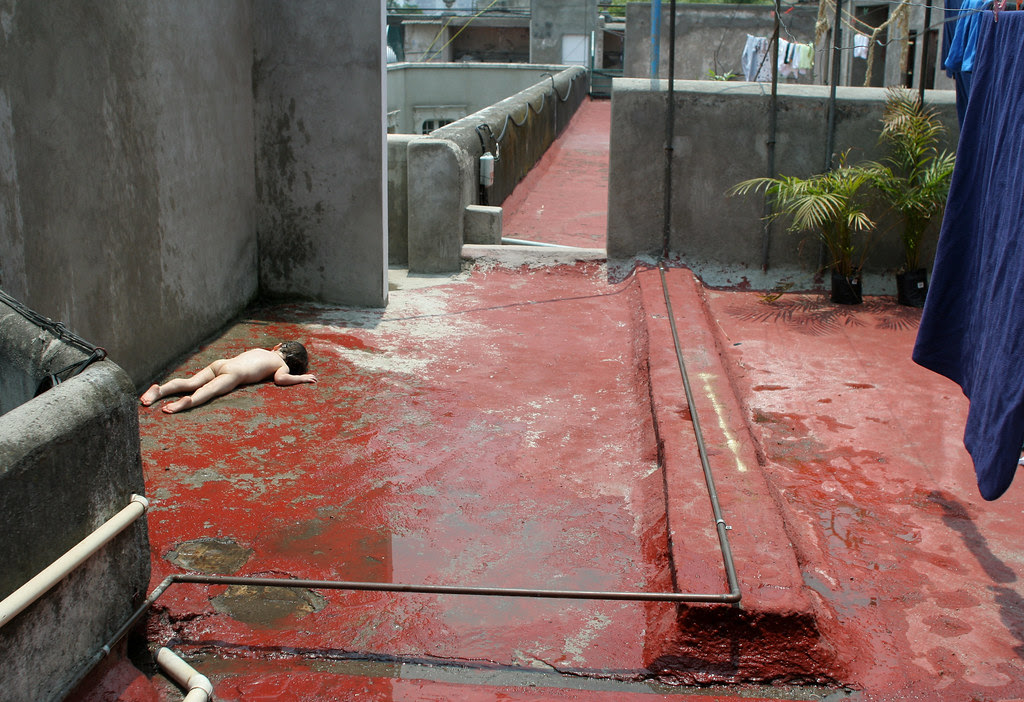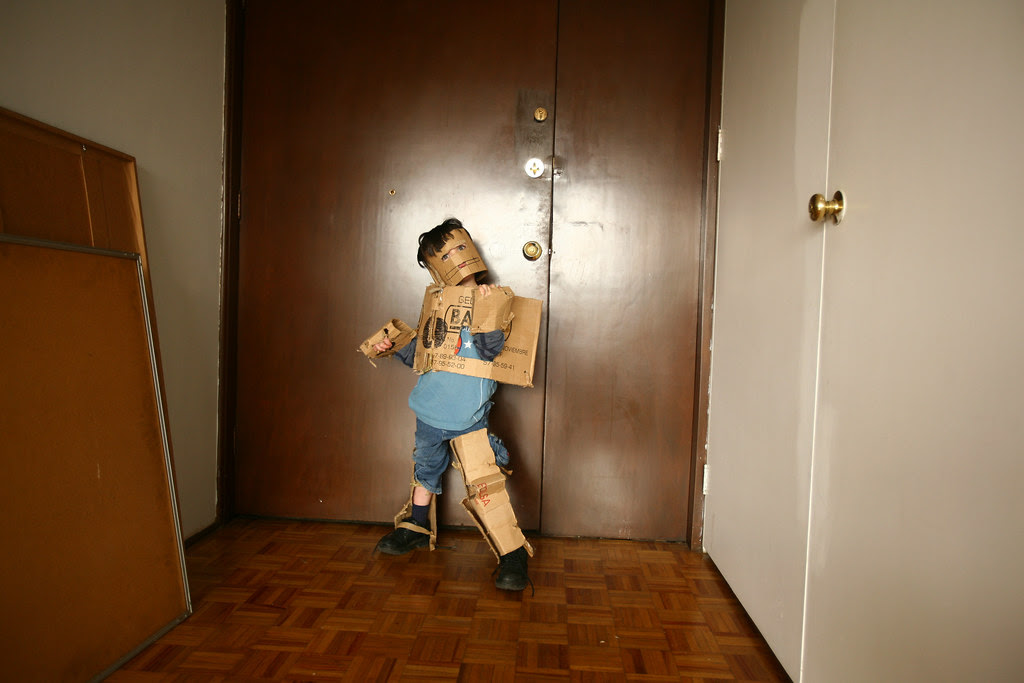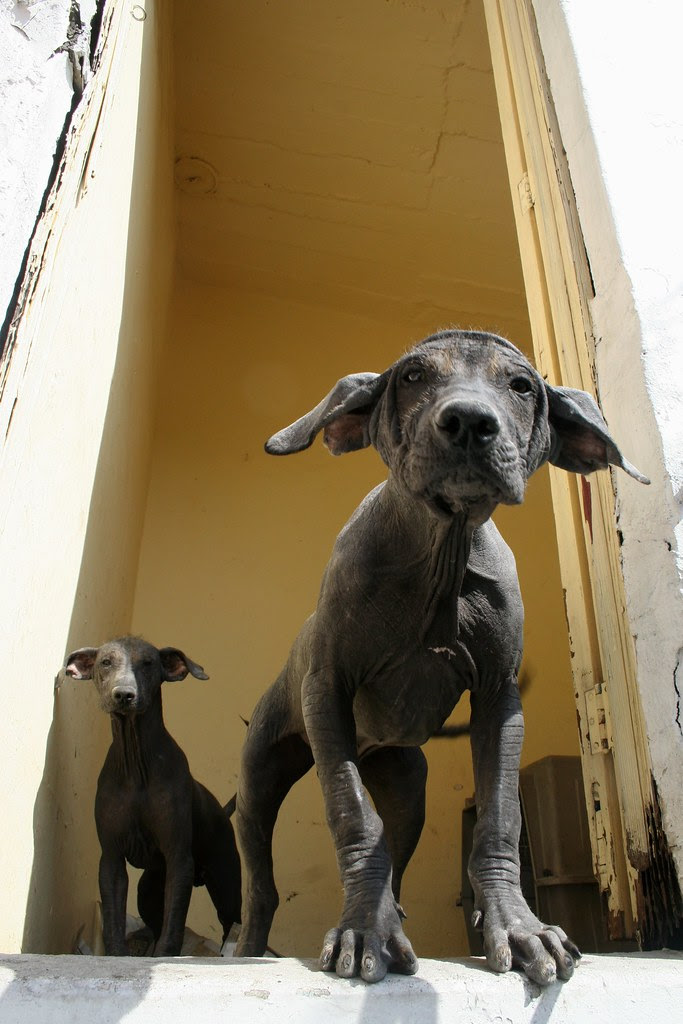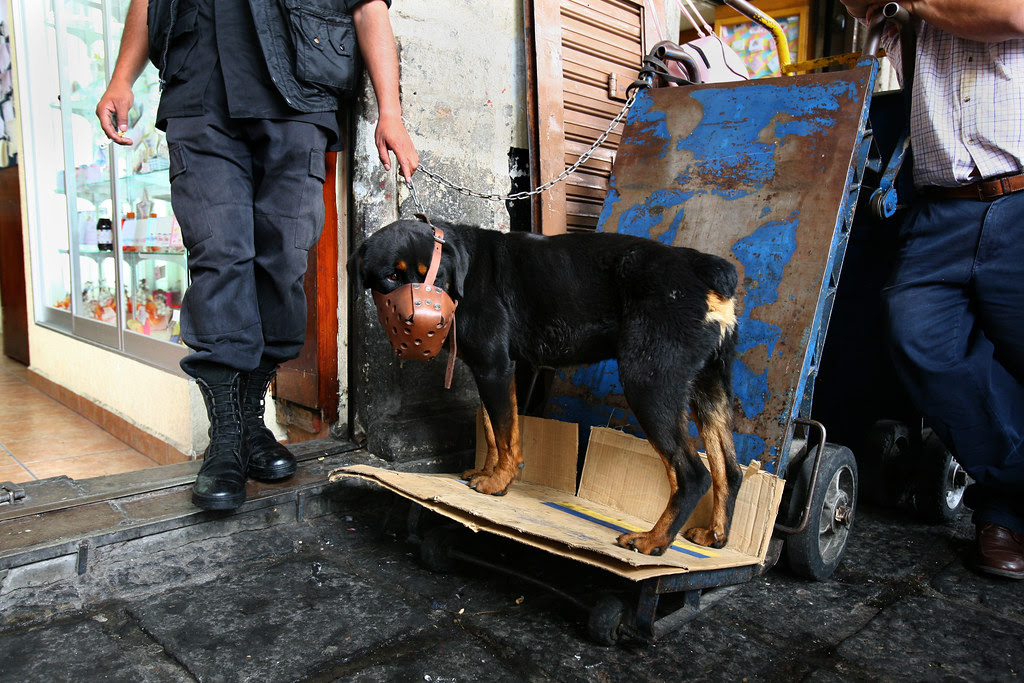.

IMG_0190 (Julian, azotea, laundry): photo by locaburg, 6 May 2006
Listen carefully, my son: bombs were falling
over Mexico City
but no one even noticed.
The air carried poison through
the streets and open windows.
You'd just finished eating and were watching
cartoons on TV.
I was reading in the bedroom next door
when I realized we were going to die.
Despite the dizziness and nausea I dragged myself
to the kitchen and found you on the floor.
We hugged. You asked what was happening
and I didn't tell you we were on death's program
but instead that we were going on a journey,
one more, together, and that you shouldn't be afraid.
When it left, death didn't even
close our eyes.
What are we? you asked a week or year later,
ants, bees, wrong numbers
in the big rotten soup of chance?
We're human beings, my son, almost birds,
public heroes and secrets.
Roberto Bolaño (1953-2002): Godzilla in Mexico, from The Romantic Dogs (Los perros románticos), poems 1980-1988, published posthumously, 2006, English translation by Laura Healy, 2008
over Mexico City
but no one even noticed.
The air carried poison through
the streets and open windows.
You'd just finished eating and were watching
cartoons on TV.
I was reading in the bedroom next door
when I realized we were going to die.
Despite the dizziness and nausea I dragged myself
to the kitchen and found you on the floor.
We hugged. You asked what was happening
and I didn't tell you we were on death's program
but instead that we were going on a journey,
one more, together, and that you shouldn't be afraid.
When it left, death didn't even
close our eyes.
What are we? you asked a week or year later,
ants, bees, wrong numbers
in the big rotten soup of chance?
We're human beings, my son, almost birds,
public heroes and secrets.
Roberto Bolaño (1953-2002): Godzilla in Mexico, from The Romantic Dogs (Los perros románticos), poems 1980-1988, published posthumously, 2006, English translation by Laura Healy, 2008

IMG_9690 (Sunday afternoon, Mexico City): photo by locaburg, 21 December 2005

IMG_4150 (Julian, iron man): photo by locaburg, 11 October 2008

IMG_1592 (white robe, Godzilla): photo by locaburg, 6 October 2010

IMG_0848 (dog, ice cream): photo by locaburg, 16 October 2013

IMG_8746: photo by locaburg, 16 October 2013

DSCF8730 (Great Dane, Mexico City): photo by locaburg, 25 September 2012

IMG_2002 (dog, Monte Escobedo, Zacatecas): photo by locaburg, 10 January 2008

IMG_9782 (three white dogs): photo by locaburg, 8 June 2010

IMG_8807 (dogs, Xoloscuintle): photo by locaburg, 7 December 2005

IMG_0845 (muzzled dog): photo by locaburg, 11 September 2009

IMG_1482 (dog, skull, Xoloscuintle, iztapalapa): photo by locaburg, 16 February 2011

IMG_7684 (dog, car, brick): photo by locaburg, 22 December 2009



6 comments:
Oh, that is heart-breaking. Almost birds, I don't know. But secrets, yes.
Yes, secrets inevitably; but I've never felt farther from qualifying as an almost bird; unless it's the prehistoric auk, unable to keep itself from tipping over and thus doomed to early elimination in the evolutionary sweepstakes.
Public hero likewise hardly a role that would reasonably be aspired to by... an auk
But as we know Bolaño was not a writer to turn down the opportunity for a flamboyant gesture.
From early on he considered poetry his destiny, and in poetry his hero was Nicanor Parra; though Borges also figures in this, and for that matter it seems Bolano was quite sensitive to, aware of and willing to use the work of a great range of writers who had preceded him -- not only Spanish American and Latin American but European.
__
from a useful piece by the late Aura Estrada:
Like Borges -- whose stature as a poet within the Latin American literary tradition Roberto Bolaño, on several occasions, attempted to vindicate -- Bolaño began his career as a poet, but, to be precise, as a poet maudit. He founded an ephemeral school called "infrarealism" that was both ephemeral and dispersed. Bolaño's new start as a narrator did not make him lose his passion for poetry, which he knew well and followed closely. He once declared that the best poetry of the twentieth century had been written in prose, citing Joyce as an example.
The figure of the poet is a central, almost mythical figure in his novels. In them are encoded lucidity and bravery. In his article "La mejor banda" ("The best gang"), he writes these lines to justify the plots of one of his one of his major novels, Los detectives salvajes (The Savage Detectives):
"If I had to rob the most secure bank in Europe and could freely select my partners in crime, I would definitely choose a group of five poets. Five true poets, Apollonean or Dionysiac, it's all the same, but real ones, that is to say, with a poet's destiny and life. There is no one in the world more valiant. There is no one in the world who can face disaster with greater dignity and lucidity... like astronauts lost on planets with no possible escape; or in an exile without readers or editors, only verbal constructions or idiot songs sung not by men, but by ghosts. In the writers' guild they are the most prized and least coveted of jewels. When a crazed youth decides to become a poet at age sixteen or seventeen, it's a surefire family disaster."
In this paragraph is encoded the plotline of Detectives, a novel in which a group of young poets set out in search of Cesárea Tinajero, a mysterious avant-garde Mexican poet who disappeared from the literary scene in the early twentieth century. During their quest, some go mad, others prostitute themselves, others die; but all fervently read or write or admire or detest poetry.
In Bolañesque mythology, poets are beings who have nothing to lose. Only from that detachment can true literature be born. Warning: when he talks of poets, Bolaño isn't thinking of the respected Pablo Neruda or the dreaded Octavio Paz, he's thinking Borges, Roque Dalton, Gabriela Mistral, Enrique Lihn, Rodrigo Lira, and above all, Nicanor Parra, who was according to him *the* poet by antonomasia. Yet for all his love of poetry, Bolaño never forgets to tell a story in his novels. In this sense, he shares with Borges a classic vision of the novelist as maker, as storyteller.
Aura Estrada (1977-2007): Borges, Bolaño and the Return of the Epic, trans. by T.G. Huntington, via Words without Borders
I didn't feel ready for this yesterday (it was that kind of day), but I am very glad that I read it this morning. Apart from what I appreciated in Bolano's writing, I learned a lot in your comments. Like Nin, I definitely alighted (more like stopped) on "almost birds." It's funny, this was the last thing Caroline and I talked about before bed last night. We never properly appreciated birds until we adopted a couple and now these fellow creatures occupy a large part of our thoughts. I really wonder what they think of us -- flying vs. not being able to fly is a major quality distinction, I believe. Is Octavio Paz "dreaded" chiefly for his political thoughts and actions or is this based on his writing? Curtis
When it left, death didn't even
close our eyes.
"Almost birds/ public heroes and secrets" makes the human seem something worth aspiring to.
I do like Bolano's bonkers notion of a poet. Here's to the idiot songs.
Considering what we're seeing and hearing out of the allegedly sane folk these days, bonkers definitely seems the best way to go.
Post a Comment